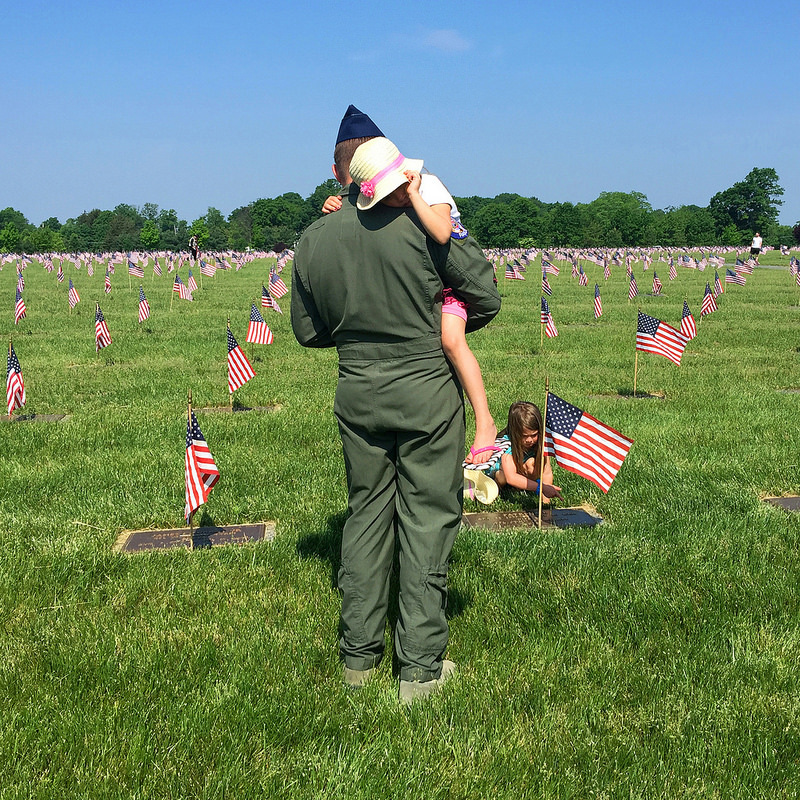|
Memorial Day Remembrances I watched the light fade out of SGT Devereaux’s eyes.* A strikingly handsome soldier with shaved head and colorful tattoos, he’d been joking around about an incident the previous day where he’d hit the ground after a car backfired nearby — the kind of strained ‘funny’ story combat veterans sometimes tell about their PTSD reactions. He’d ended the story with a big laugh, head thrown back and eyes sparkling. Then he began to speak about the nineteen year old soldier who hadn’t returned from a mission seven years ago, a young guy he’d taken under his wing and steadied when they deployed into the wild chaos of Iraq. “His truck got blown out from under him. I’ve never been able to make sense of anything after that,” Devereaux told me, his eyes now flat. On Memorial Day, as we remember service men and women who have given their lives in combat, we should also extend our compassion to those who stood next to the ones who died. We have grave markers and memorial services for those who never returned, but the combat brothers and sisters, the buddies, the friends who fought beside them carry less visible markers, a wound to their souls that is unseen, but tender and lasting. I’d been a psychotherapist in private practice for nearly thirty years when I took a job counseling troops returning from combat in Iraq or Afghanistan. I was assigned to several different bases during my two and half years in that role, speaking with thousands of combat veterans and their spouses. As we talked about the challenges of re-entry, I often found us sliding into hushed, halting conversations about the moment they lost their friend. No hardened warriors in those conversations; their faces would drop in sorrow, their sadness raw and abiding. They coped in a variety of ways. Some stayed angry many years after the friend died; their bitterness could suddenly lash out at anyone who revived that hurt. Some harbored such deep grief, they couldn’t bring themselves to say their buddy’s name. Others embraced rituals for their dead comrades: toasting them before taking a drink; keeping a worn photo tucked behind the credit cards in their wallet; paying somber tribute each time the date of that fateful firefight, IED explosion, or sniper hit rolled around. Or some, like Devereaux, seemed to go dead inside, sealing off the pain in a way that could keep them distant from friends, partners, and other service men and women. I saw a pristine example of quiet grief mixed with profound respect when I watched a staff sergeant preparing his uniform to escort a buddy’s body back home. His white-gloved hands moved slowly, reverently as he measured and re-measured the position of each medal on the chest of his uniform until he knew each one was placed perfectly. “He was my soldier, ma’am,” he said quietly. LCPL Davidson’s grief was more vivid. A muscled, compact Marine with grey eyes, he turned away to compose himself when he recalled his combat buddy dropping away from him as they waded through a firefight in Afghanistan. His eyes brimmed with tears, and waves of pain crossed his face as he recalled the moment when he felt his friend’s body fall against his own, then drop to the ground. Although war deaths might have diminished in recent years, every single loss affects those who served with the fallen – affects them for the rest of their lives. A Vietnam vet I spoke with was puzzled about a heavy fog of depression that hampered him for several days, until he remembered it was the anniversary of an airman-buddy’s death in the jungles of Vietnam. Even though he hadn’t consciously remembered the date, his psyche, fully oriented to the loss, had plunged him into grieving. So this Memorial Day, remember the fallen, but remember as well that any time you’re talking to a combat veteran, you’re most likely speaking to someone who’s lost a friend (maybe many friends), someone who is moving through life with a burden you don’t necessarily see. You don’t need to bring it up or press the veteran to tell the story – but simply by knowing the cost of combat deaths to those who came home, you can share a bit of the weight. We all can. *Author’s note: all names, ranks and physical descriptions have been changed to protect privacy. Previous comments: danny johnson says: Charlie Mills says: Bob says: Marlena says: Bob Day says: winnie says: Daphne says: lynn wilson says: Sara Pearson says: Luther Rudolph says: Ann Quinn says: Lynne says: Michael says: Karen says: LuAnn Keener-Mikenas, LCSW says: Paul says: dagmar says: |
Elizabeth Heaney - AuthorClinical Psychologist, teacher, private counselor. She speaks and writes about her work with service members. Archives
November 2020
Categories
All
|
|
All content (C) Elizabeth Heaney except where noted. All rights reserved, 2016.
Web design by GraphicMedia Design
|

 RSS Feed
RSS Feed